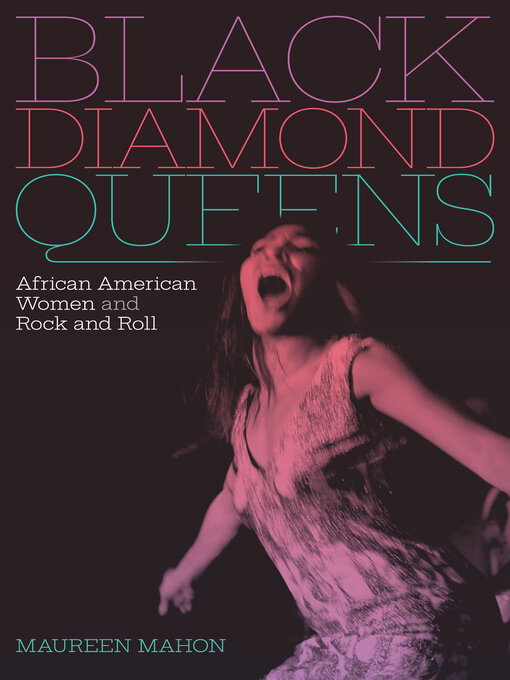- HPU Campus Histories
- Business
- Religion & Spirituality
- Self-Improvement
- History
- See all nonfiction collections
-
Creators
-
Publisher
-
Release date
January 17, 2024 -
Formats
-
Kindle Book
-
OverDrive Read
- ISBN: 9781478012771
-
Open PDF ebook
- ISBN: 9781478012771
- File size: 32859 KB
-
-
Languages
- English
-
Reviews
-
Booklist
Starred review from September 1, 2020
Long misrepresented as an exclusively white, male genre, rock and roll has been significantly shaped by the African American women who endure erasure within the genre. Cultural anthropologist Mahon (Right to Rock, 2004), brings a critical eye to her work, continually contextualizing the genre and its performers amongst larger considerations. For example, Mahon explains, assigning higher value to instrumentation has decreased the value assigned to vocalization and, by extension, to the artists who vocalized. A bright, straight line can be drawn between Big Mama Thornton's 1953 hit single Hound Dog, covered upwards of ten times, and Elvis Presley's 1956 version that netted him millions. The power of Mahon's writing is in her nuanced unpacking of the fibers of that connection and others, to include the performance of gender and sexuality, commercial limits placed on Black-owned labels by white institutions, and suppressed histories. With depth and breadth, Mahon's work centers the many African American women who heavily influence rock and roll, from LaVern Baker to Tina Turner. Rock and roll emerged neither from a vacuum nor from the minds of white, male performers alone. Mahon's comprehensive research and intelligent thinking are captured in her compelling writing.Women in Focus: The 19th in 2020(Reprinted with permission of Booklist, copyright 2020, American Library Association.) -
Kirkus
September 1, 2020
Snapshots of some of rock 'n' roll's greatest Black female performers, underappreciated in rock's broader history. NYU music professor Mahon argues convincingly that Black women have been pivotal to rock music's evolution. Think of Big Mama Thornton's "Hound Dog," repurposed by Elvis Presley, or Tina Turner's skill at bridging R&B, rock, and pop. But their influence, notes the author, has been stifled in a variety of complicated ways. They've often been hired as background singers to lend "authenticity" to White rock performers yet exiled from the genre when they took center stage. Patti LaBelle, for instance, came up all but anonymously in a 1960s girl group and as part of the '70s trio Labelle, considered outliers or a one-hit disco act on the basis of their song "Lady Marmalade." Mahon argues that women rockers had to cultivate "betwixt and between" genres to find a footing, even while that strategy made success fleeting for the likes of Labelle, LaVern Baker, and the Shirelles--a shame because artists like Claudia Lennear and Betty Davis made indelible, path-breaking albums. Allowing these women to be more than window dressing or provide more than a dash of vocal "blackness" was a perceived threat. The band Humble Pie got push back when it made its Black female backing singers equal partners. In one excellent chapter, Mahon explores the stereotypes exemplified by the Rolling Stones' "Brown Sugar" through three women connected to Mick Jagger. Mahon's book lacks the sweep of a fully fleshed history, effectively ending the story with Turner, though she makes mention of recent artists like Santigold and Alabama Shakes. But if the narrative arc is brief and the prose occasionally burdened by academic stiffness, Mahon has done plenty to expose how Black women rockers have been marginalized by musicians, audiences, historians, and critics. A well-researched, sociologically savvy effort to expand the rock canon.COPYRIGHT(2020) Kirkus Reviews, ALL RIGHTS RESERVED.
-
subjects
Languages
- English
Loading
Why is availability limited?
×Availability can change throughout the month based on the library's budget. You can still place a hold on the title, and your hold will be automatically filled as soon as the title is available again.
The Kindle Book format for this title is not supported on:
×- - Kindle 1
- - Kindle 2
- - Kindle DX
- - Kindle Keyboard
- - Kindle 4
- - Kindle Touch
- - Kindle 5
- - Kindle Paperwhite
- - Kindle 7
- - Kindle Voyage
Read-along ebook
×The OverDrive Read format of this ebook has professional narration that plays while you read in your browser. Learn more here.


